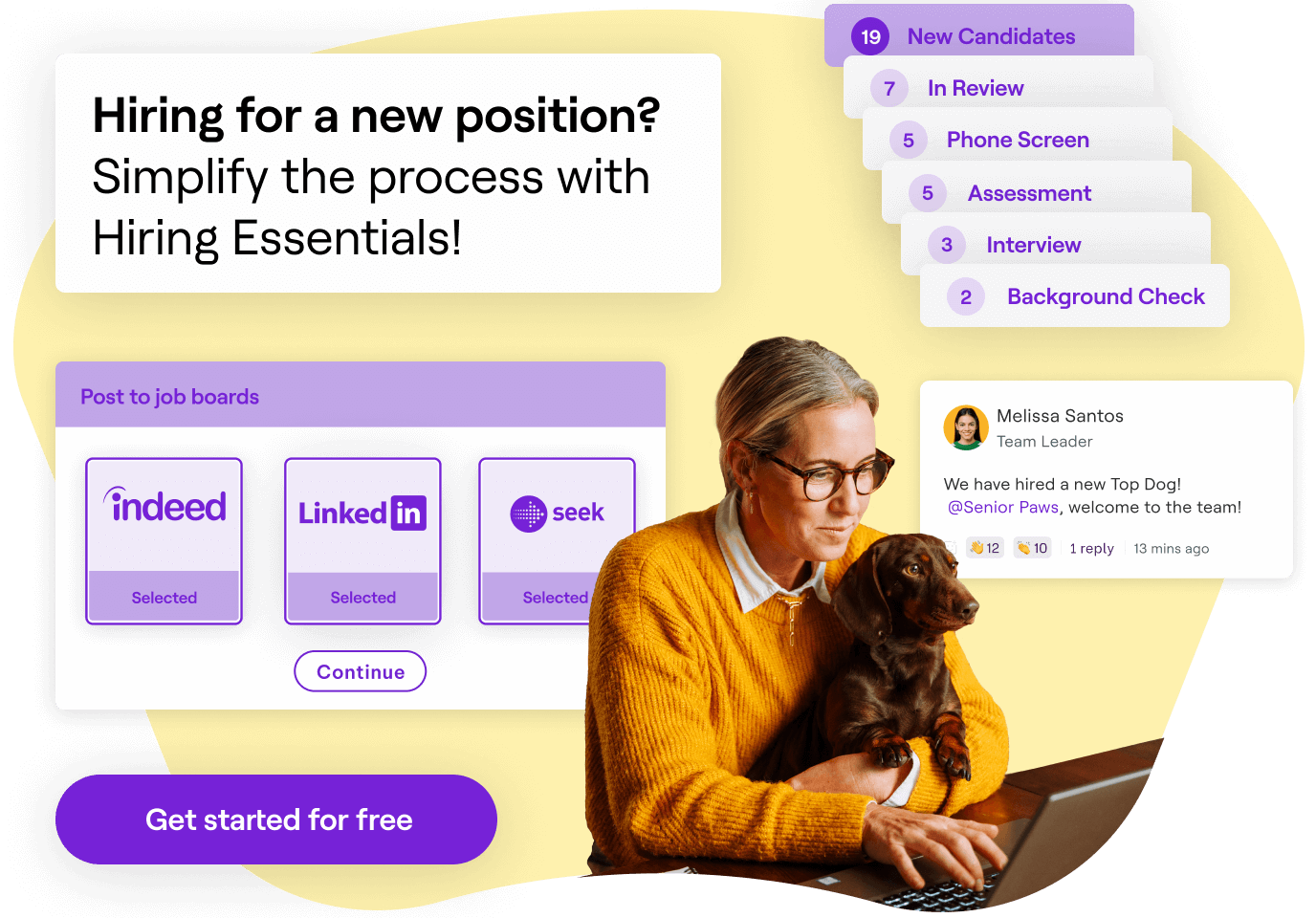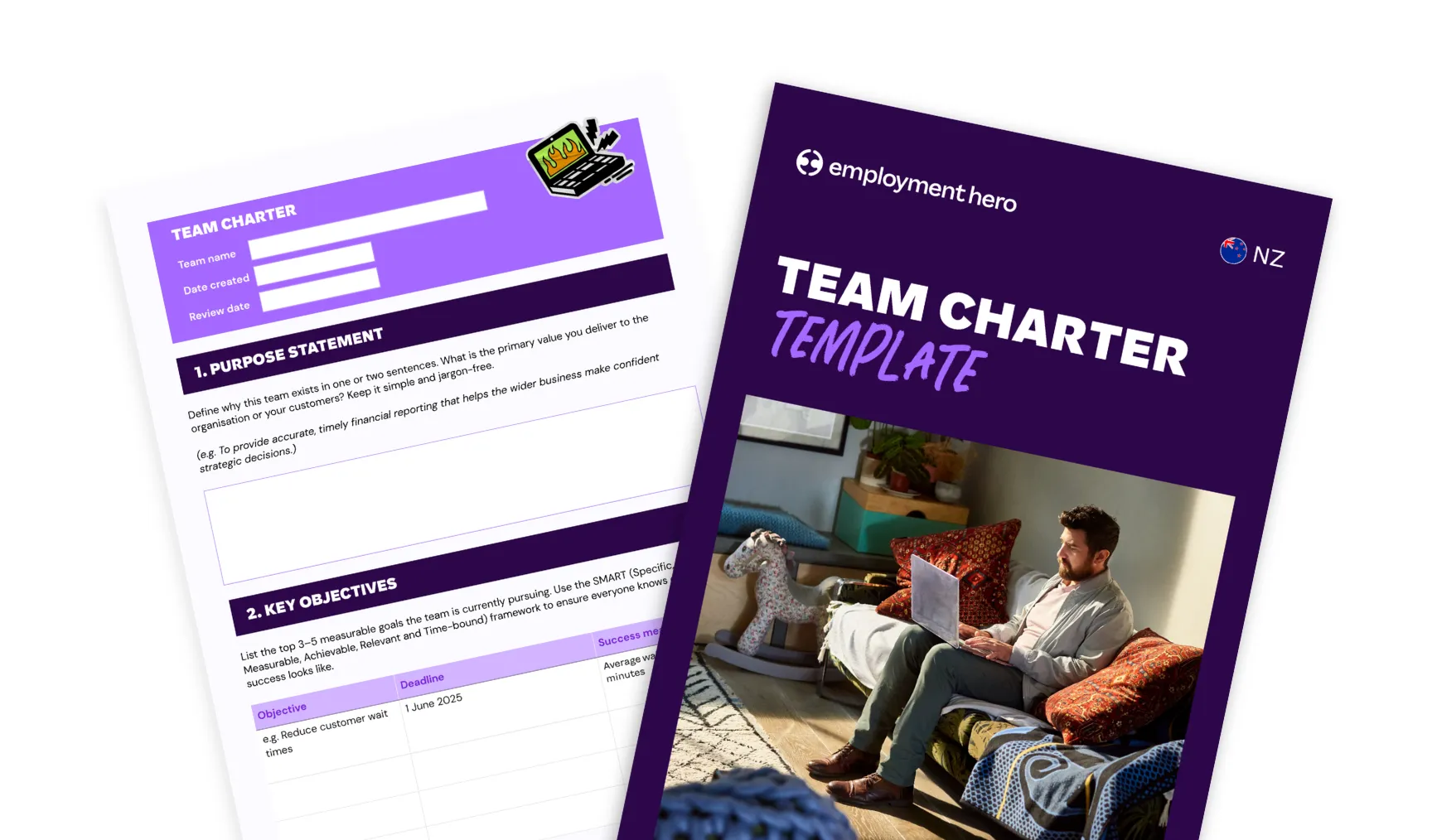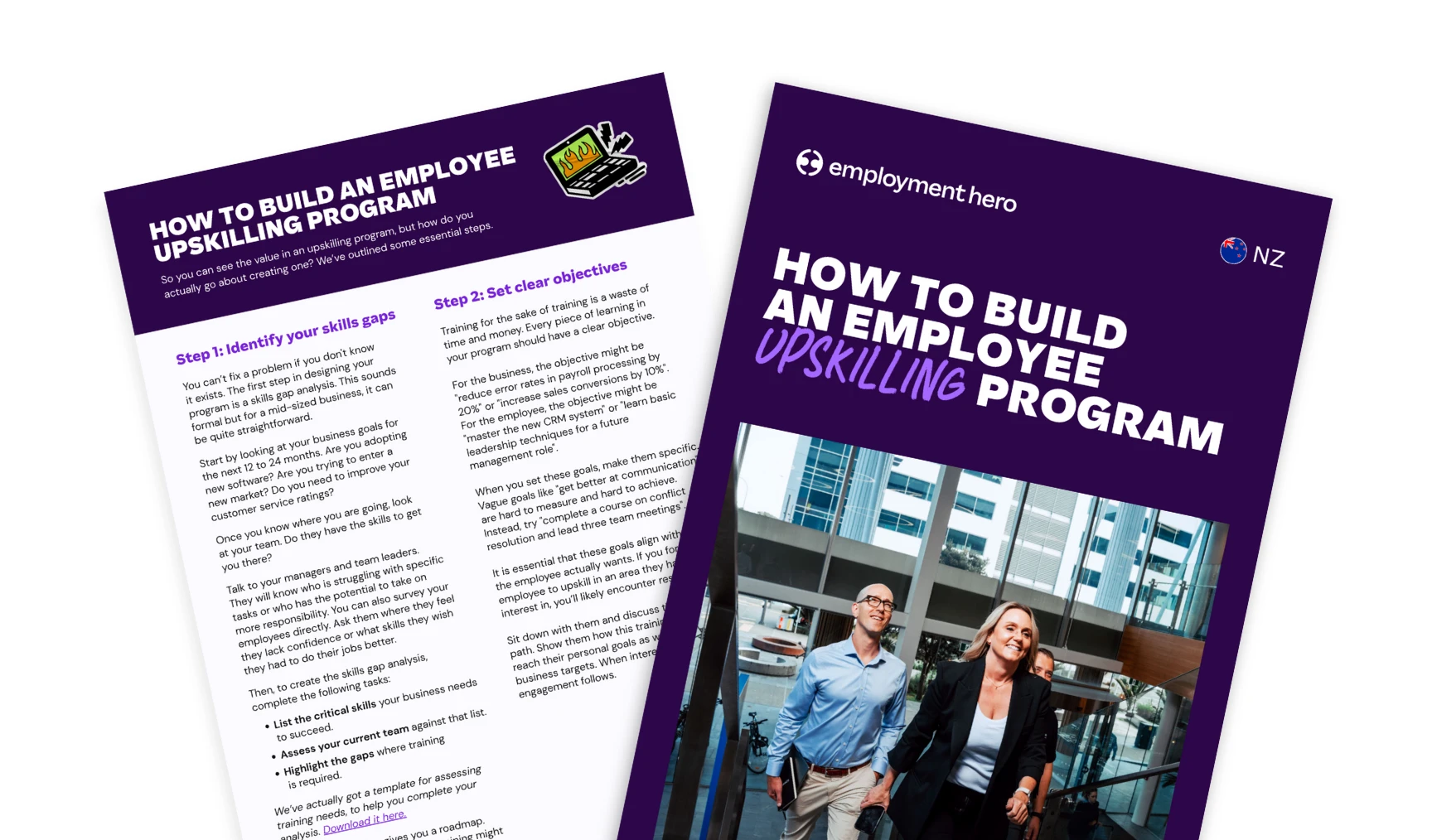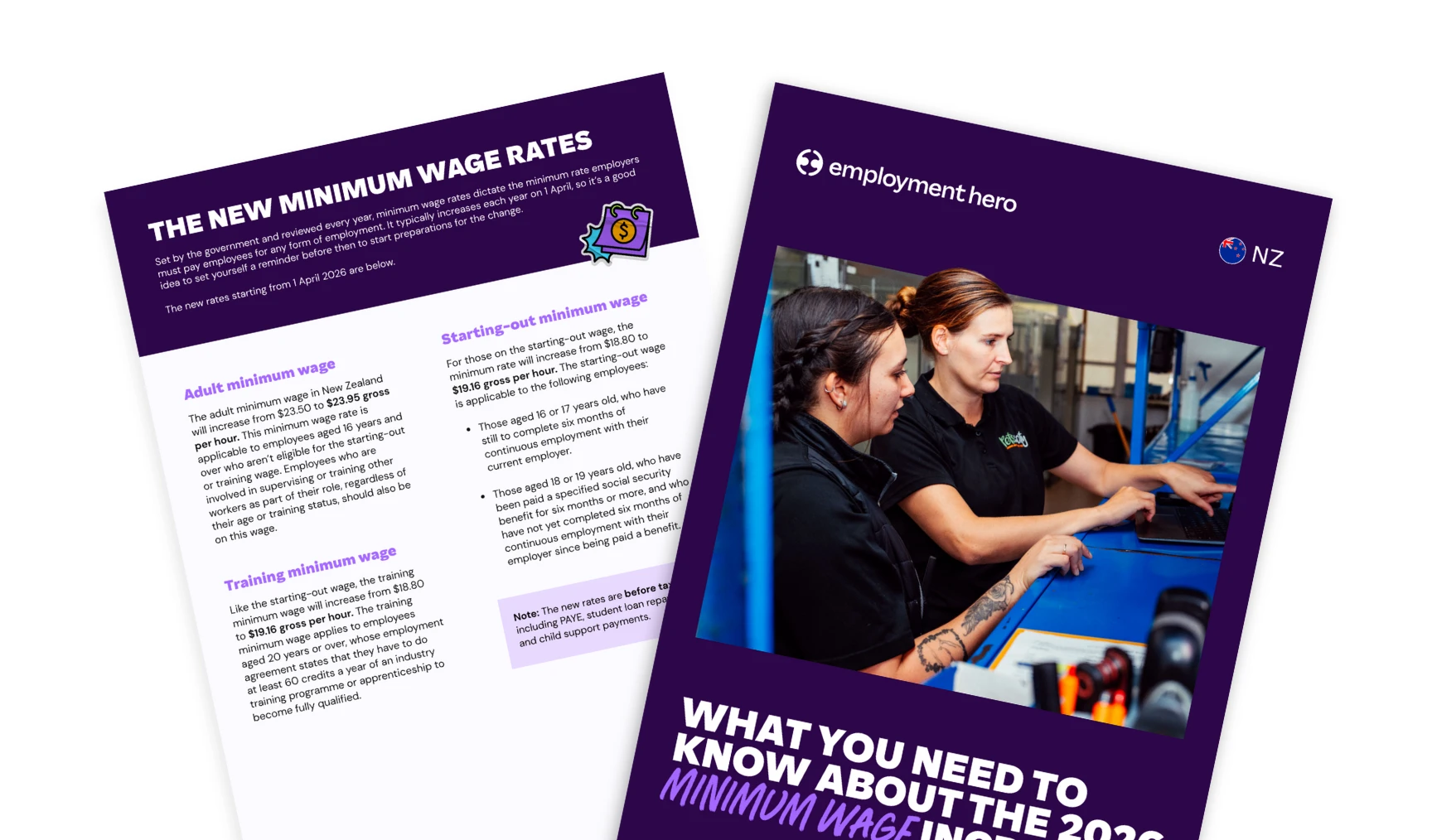Independent contractor rights in New Zealand [Factsheet]
Published
Independent contractor rights in New Zealand [Factsheet]
What can you expect from this guide?
Independent contractors come in handy for small businesses where you rely on outsourcing part of your work. However, simply labelling a worker an independent contractor does not make it so in the eyes of the law.
It’s essential to focus on the actual nature of your working relationship to determine whether a court would be more likely to find that person an employee.
We’ve developed this independent contractor agreement NZ factsheet in partnership with a legal expert and information from the Ministry of Business, Innovation and Employment to help you draw a clear distinction between employees and contractors in the eyes of the law.
Disclaimer: The information in this guide is relevant as at 10 August 2023, and has been prepared by Employment Hero Pty Ltd ABN (11 160 047 709) (Employment Hero). The views expressed herein are general information only and are provided in good faith to assist employers and their employees. The Information is based on data supplied by third parties. While such data is believed to be accurate, it has not been independently verified and no warranties are given that it is complete, accurate, up to date or fit for the purpose for which it is required. Employment Hero does not accept responsibility for any inaccuracy in such data and is not liable for any loss or damages arising either directly or indirectly as a result of reliance on, use of or inability to use any information provided in this written guide.
Hiring independent contractors vs employees in NZ
So what are the key differences between these two types of employment? We’re here to break it down for you.
What is full-time employment?
Full-time employment is when employees are on a permanent contract where they work for a minimum amount of hours per week (usually around 35-40 hours). Full-time employees are generally entitled to paid leave and a written notice or payment on termination.
What is independent contractor work?
Contracting is employment undertaken on an agreed short-term basis. The period of work can vary between days or months. Contracts vary depending on the working arrangement but usually take form as either a fixed-term (specific time only) or renewable (can be continued for a longer period if both parties agree).
 Should you hire an independent contractor or a full-time employee?
Should you hire an independent contractor or a full-time employee?
The benefits of hiring independent contractors
1. Flexibility
A key positive of contract work is that the number of hours worked is agreed upon beforehand, so employers can select the time and money spent on the specific project.
2. They will likely provide their own equipment
Contractors have to provide their own tools and equipment (unless otherwise agreed), therefore less organisational assets are used. For example, if you are hiring a freelance writer – they will use their personal device to complete the work.
3. There’s less commitment
Some contract workers can be engaged for as little as one day, meaning that if you don’t like working with a contractor, you’re not obliged to stay with them longer than the agreed period.
4. Access new perspectives
Working with professionals outside of the business gives your company a fresh set of eyes to help you stay competitive.
5. Less payroll administration
While it varies by country, generally contractors will manage tax and Kiwisaver contributions on their own account. As contractors are their own business, they pay their own tax (rather than it being deducted from payslips). They essentially work for themselves—meaning less expenses for the company.
The drawbacks of hiring independent contractors
1. They can be time-intensive
There is a risk of hiring an external contractor to work with your organisation as they’re not familiar with the company’s goals, values and culture, potentially causing issues within the business. The time spent showing them the ropes and aligning them with your company’s culture is all for nothing when they move on.
2. You may lose them to another job
Contracting is on a term-by-term basis, so there is the risk of the contractor not returning to work for you again as they have other commitments or have been offered a permanent contract elsewhere. If you’re scared of losing a contractor, consider offering them full-time employment.
3. You have to adjust your employment relationship
As contractors have a high level of control and autonomy over their projects, it is hard to maintain an employee/contractor relationship. While you can provide feedback as a client, you cannot interfere with their work. As they also will likely be working with more than one client at a time, you will also not be their top professional priority as you would be to full-time staff.
4. They are not covered by your insurance
Contractors generally aren’t covered under your company’s insurance, making you liable for any injury sustained on the job. Ensure you include necessary insurance requirements into the contract before they start to avoid this.
5. Wages
For reasons we’ll outline later, contractors’ wages usually cost organisations around 15-20% more than permanent staff.
 The benefits of hiring permanent employees
The benefits of hiring permanent employees
1. Productivity
Permanent employees are always focusing on the business as they have a schedule and can get more work done as they are not restricted to a short-term contract. Unlike independent workers, the company manages their employment administration (think paying taxes, contributions and retirement), giving them more time in the day.
2. They have company loyalty
Employees have a sense of connection to their organisation and are always readily available to help. Through employee engagement and positive culture, permanent employees feel a sense of belonging to an organisation as a vital team member.
3. Consistency
As permanent employees are committed to the business, they have their routine and know the organisation in depth they will perform tasks consistently and on an ongoing basis.
4. They can be cost-effective
Contractors generally cost more per hour than a permanent employee. If you need work done over a long period of time, having a permanent staff member is definitely the most economic way to do it.
5. They can be time efficient
Unlike having to go through onboarding procedures each time you hire a new contractor, you only have to onboard new hires once.
6. You can give them greater direction
Permanent employees perform tasks under the guidance and direction of their employer giving you more control over how things are done and what the final project looks like.
The drawbacks of hiring permanent employees
1. You have to effectively manage their admin
Payroll, policies, insurance, leave – all of these employee entitlements fall to you as an employer to manage! However, with tools like Employment Hero’s HR and Payroll tools, these don’t have to be the time-consuming task they once were.
2. Inflexibility
When you hire a permanent employee, you do so for the low and high periods for your business – which could be somewhat of a financial risk. They will be with you regardless of how busy or quiet company activities are. This can, however, also be a good thing. During slower times your team will be able to complete organisational or strategic tasks.
3. You need to provide all equipment
Employees of your company will need to be provided with all the tools and equipment they need to complete their jobs. You may also need to manage an office space. However, a remote-first culture is always an option.
4. You need to manage team strategy
Permanent employees require long-term thinking around development, team-building, employee wellness and more. Even though there can be great benefits to managing these things, it is a big commitment.
 Why do contractors get paid more?
Why do contractors get paid more?
A contractor’s hourly rate will generally be higher than that of a full-time employee for a number of reasons, but primarily to supplement the lost benefits that an employed worker is entitled to.
Contract workers also have more flexibility in setting their rate. While a full-time employee may have an annual performance review and salary adjustment, a contract worker can generally adjust their rate based on client type and demand.
Are there employment laws protecting independent contractors in NZ?
When it comes to employment law, contract workers aren’t usually protected by the Employment Relations Act and don’t have access to things like annual leave or sick leave, or holiday pay. They can’t bring a personal grievance in the event of dismissals and have to pay their own tax. General civil law determines their rights and responsibilities.
That said, health and safety laws, the Privacy Act 1993 and the Human Rights Act 1993 all apply to both employees and contractors.
Manage both employees and contractors with Employment Hero
We’re here to help you manage all your employee records, regardless of whether they’re full-time employees or independent contractors. Employment Hero is a full digital solution for all aspects of HR and payroll, from onboarding and contract management to performance management and leave administration. Find out how we can support you today.
Interested in getting a head start on recruiting? Try our Hiring Essentials package and get access to a full suite of recruitment tools. Best of all, it’s free forever.

Download the factsheet now
Related Resources
-
 Read more: How to create a team charter: Template and guide
Read more: How to create a team charter: Template and guideHow to create a team charter: Template and guide
Create high-performing teams effortlessly with our essential team charter template. Discover practical steps and tips to enhance collaboration.
-
 Read more: Building an employee upskilling program: Training program template
Read more: Building an employee upskilling program: Training program templateBuilding an employee upskilling program: Training program template
Learn how to design a successful employee upskilling program in NZ. Build skills, boost retention, and future-proof your workforce with…
-
 Read more: What you need to know about the 2026 minimum wage increase
Read more: What you need to know about the 2026 minimum wage increaseWhat you need to know about the 2026 minimum wage increase
The minimum wage rate increase on 1 April 2026 applies to many Kiwi employers. We’ve compiled all the information you…





















